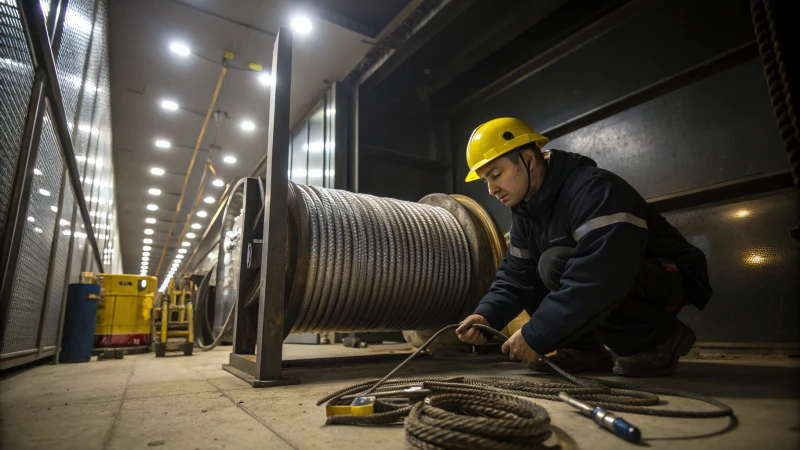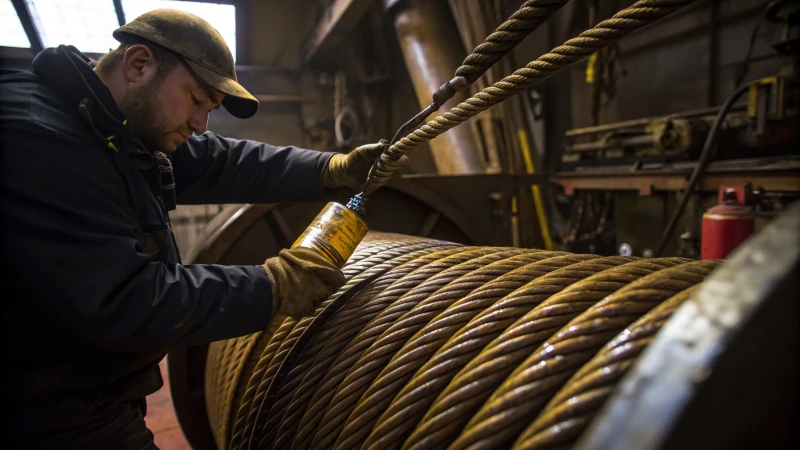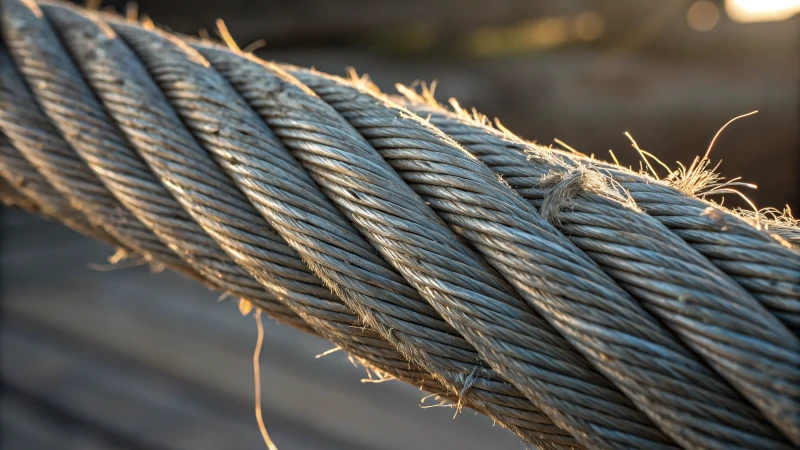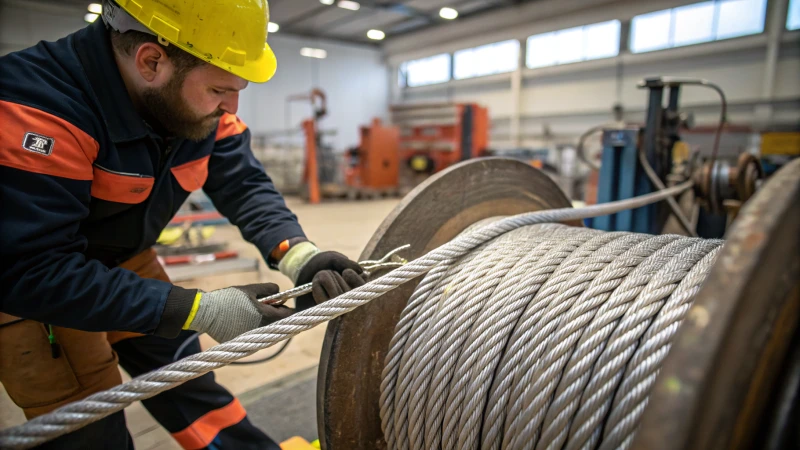
Have you ever wondered what keeps an elevator ride so smooth and safe? It’s all about the ropes!
Elevator rope lubricants are essential because they reduce friction, minimize wear and tear, and boost the durability of steel wire ropes, ensuring safe and efficient elevator operations.
Years ago, when I first started in the maintenance field, I underestimated the power of lubrication. I remember a time when overlooking the lubrication schedule led to a nerve-wracking elevator halt. Since then, I’ve been a staunch advocate for timely maintenance. Understanding the types of lubricants and their application isn't just about keeping things running—it's about safety. Let's dive deeper into how these lubricants work their magic.
Elevator lubricants prevent rope corrosion.True
Lubricants protect steel ropes from moisture and rust, extending lifespan.
All elevators use the same lubricant type.False
Different elevators require specific lubricants based on design and usage.
What Types of Lubricants Are Best for Elevator Ropes?
Ever wondered what keeps elevator ropes running smoothly and safely? Choosing the right lubricant is key to their performance and longevity.
Graphite-based lubricants and synthetic oils are ideal for elevator ropes due to their superior friction reduction and corrosion protection. These lubricants help extend rope lifespan by minimizing heat and wear during operation.

Understanding Elevator Rope Lubrication
I still remember the first time I had to decide on a lubricant for elevator ropes. It felt a bit like picking the perfect sauce for a dish—every choice had its unique flavor, but I needed the one that would complement the ropes, ensuring their smooth operation and longevity. Elevator ropes need specialized lubricants to keep them running without a hitch. The main job of these lubricants is to cut down friction between the rope strands, which helps prevent wear and tear. Plus, they shield against corrosion1 by creating a protective layer.
Common Types of Lubricants
- Graphite-Based Lubricants: These are the unsung heroes in my toolbox. They excel in dry lubrication, creating a fine layer on metal that doesn’t just lubricate but stays put without inviting dust and debris to the party.
- Synthetic Oils: Imagine a reliable friend who performs consistently no matter the weather. These oils are designed to handle different temperatures, offering stable viscosity2 and resisting breakdown even under high stress, which makes them perfect for elevators in tough conditions.
- Grease-Based Options: Although not my go-to for elevator ropes, certain grease types do come in handy when extra adhesion3 is needed. But be ready for some cleaning, as they tend to attract dirt.
| Lubricant Type | Advantages | Considerations |
|---|---|---|
| Graphite-Based | Excellent dry lubrication | May require reapplication |
| Synthetic Oils | Temperature stable | Higher cost |
| Grease-Based | High adhesion | Attracts dirt |
Factors Influencing Lubricant Choice
Whenever I select a lubricant, I consider several factors to ensure everything runs smoothly.
- Environmental Conditions: Humid or corrosive environments call for lubricants with anti-corrosion properties.
- Rope Material: The rope's makeup can guide which lubricant fits best.
- Operational Load: For heavy-duty work, I lean toward lubricants that can handle greater pressure4.
Thinking through these factors helps me pick the right lubricant to keep elevators safe and efficient. For more detailed guidance on how different lubricants fare in various conditions, plenty of comprehensive guides are available online.
Graphite-based lubricants attract less dirt than grease-based ones.True
Graphite forms a dry layer, reducing dust attraction compared to grease.
Synthetic oils are the cheapest option for elevator ropes.False
Synthetic oils are typically more expensive due to their stability and performance.
How Often Should Elevator Ropes Be Lubricated?
Ever wondered how often those crucial elevator ropes should be oiled up? Trust me, it's more important than you think!
Elevator ropes need lubrication every three to six months, varying by how much they're used and the conditions they face. Proper lubrication cuts down on friction and wear, boosting both the rope's lifespan and performance.

My Journey with Elevator Maintenance
When I first delved into elevator maintenance, I didn’t realize how pivotal regular lubrication was until I faced a hiccup that nearly halted operations. It was a steep learning curve, but understanding the mechanics—how these ropes endure constant tension and movement—highlighted the importance of minimizing wear through regular oiling.
The Variables at Play
I remember managing an office building where elevators were non-stop. The ropes needed lubrication every three months, unlike the quieter residential setups I dealt with that comfortably stretched to six months.
- Usage Intensity: Like in my bustling office example, more people mean more frequent lubrication.
- Environmental Conditions: Once, an elevator in a humid basement showed rust. Lesson learned: moisture is not a rope's friend.
- Type of Lubricant Used: I once switched to graphite-based lubricants5, and it was a game-changer for high-stress environments.
| Usage Level | Recommended Frequency |
|---|---|
| High Traffic | Every 3 months |
| Moderate Traffic | Every 4-5 months |
| Low Traffic | Every 6 months |
Finding the Perfect Lubricant
Choosing lubricants felt like picking the right tool for a job. When I opted for synthetic oils6, they offered superb protection against wear and corrosion—something I can’t stress enough!
I suggest getting advice from industry experts7 because they can provide tailored insights.
Staying on Top of Maintenance
Visual inspections became my routine ritual. They helped catch issues early, keeping elevators safe and operational—much to my peace of mind!
| Maintenance Task | Frequency |
|---|---|
| Visual Inspection | Monthly |
| Lubrication | 3-6 months |
| Comprehensive Check-up | Annually |
By following these practices, I found that not only did I extend the life of the elevator ropes, but I also ensured a safer ride for everyone using them.
Elevator ropes need lubrication every 3-6 months.True
Lubrication frequency depends on usage intensity and environmental conditions.
Graphite-based lubricants are unsuitable for elevators.False
Graphite-based lubricants are recommended for extreme conditions.
What are the consequences of neglecting rope lubrication?
Ever wondered what happens if you ignore rope lubrication? Trust me, it's a slippery slope that can lead to serious problems.
Neglecting rope lubrication leads to increased friction, wear, and potential failure. It reduces rope lifespan by up to 30%, impacting safety and efficiency in industries like construction and mining.

Increased Friction and Wear
I remember a time when I thought skipping a step in maintenance wouldn't matter. Boy, was I wrong! When ropes aren't lubricated properly, the friction between the steel wires skyrockets. It's like when you rub your hands together really fast—they heat up and start to feel uncomfortable. The same thing happens with ropes, only this friction-induced wear8 causes wear and tear that can drastically cut their lifespan.
Premature Rope Failure
Picture this: you're in charge of a busy construction site, and suddenly, the main elevator halts because of a snapped rope. Heart-stopping, right? Without lubrication, ropes endure more friction and are prone to early failure. It's critical, especially when lives depend on them. A study I came across (ISO 2219) showed that well-lubricated ropes last up to 30% longer than their dry counterparts.
Decreased Corrosion Resistance
I once worked near the coast where salty air was a constant battle for metal surfaces. Lubrication serves as a protective shield against corrosion. Without it, ropes in harsh environments like mines or offshore rigs can corrode faster than you can say "rust," jeopardizing strength and safety.
| Consequence | Impact |
|---|---|
| Increased Friction | Higher wear rate |
| Premature Failure | Unexpected downtime and accidents |
| Decreased Corrosion Resistance | Shortened lifespan in harsh environments |
Economic Implications
There's nothing worse than unforeseen expenses. Skipping on lubrication can lead to more frequent rope replacements, hiking up maintenance costs and downtime. It's like needing to replace your car tires every few months because you never check their pressure! For industries relying heavily on machinery, regular lubrication is key to ensure longevity9.
Implications for Safety Standards
Ignoring lubrication doesn't just risk equipment—it could also land you in hot water legally. Many industries have stringent safety requirements that include routine maintenance checks. Non-compliance could mean hefty fines or worse, putting your team's safety at risk.
Grasping these consequences is crucial for anyone who wants to keep operations running smoothly and safely. For those keen to dive deeper into this topic, I'd suggest learning more about effective lubrication methods10 by reaching out to experts or trusted suppliers.
Lubrication reduces rope friction by 30%.False
Lubrication extends rope lifespan by 30%, not specifically reduces friction.
Non-lubricated ropes can fail prematurely.True
Without lubrication, increased friction causes wear, leading to premature failure.
How does rope lubrication affect overall safety standards?
Ever wonder why some ropes last longer and perform better than others? The secret might just be in the lubrication!
Rope lubrication enhances safety standards by reducing friction and preventing wear, leading to longer rope life and compliance with industrial safety regulations.

The Role of Lubrication in Rope Durability
I still remember the first time I realized the importance of proper lubrication. It was during a critical project where our main lifting equipment suddenly showed signs of wear. A colleague suggested checking the lubrication, and it turned out to be a game-changer. Just like that, using the right lubricants can significantly extend the life of steel wire ropes by reducing internal friction and wear. For instance, those graphite-based lubricants11 you hear about? They can actually make your ropes last up to 30% longer!
Enhancing Corrosion Resistance
If you've ever worked in harsh environments like offshore installations or mines, you know corrosion is your worst enemy. I recall a procurement officer, Emma, who once shared how crucial it was for her ropes to withstand corrosive elements. Lubrication acts like a knight in shining armor, forming a protective layer that keeps these ropes safe from corrosion, ensuring they remain strong and reliable.
Impact on Safety Standards
Ensuring ropes are properly lubricated isn't just about extending their life; it's about safety. Imagine you're responsible for a major construction project, like John, a procurement manager I once met. He emphasized the peace of mind that comes from knowing that well-lubricated ropes mean fewer risks of accidents and failures. This isn't just about ticking boxes for compliance; it's about protecting lives and investments.
| Lubrication Benefits | Impact on Safety |
|---|---|
| Reduces friction | Minimizes wear |
| Prevents corrosion | Enhances durability |
| Prolongs rope lifespan | Reduces failure risk |
Considerations for Procurement Managers
In my experience, understanding which lubricants are best for specific environments is crucial. Professionals like Klaus and David are often faced with tough decisions about purchasing. It's not just about picking any lubricant; it's about finding one that withstands extreme conditions and maintains performance12 over time.
By doing so, they ensure compliance with safety standards and achieve optimal performance, aligning perfectly with WonBon's mission to deliver reliable solutions.
Graphite-based lubricants increase rope lifespan by 30%.True
Graphite-based lubricants minimize friction, extending rope lifespan by up to 30%.
Lubrication has no impact on rope corrosion resistance.False
Lubrication provides a protective layer, enhancing corrosion resistance.
Conclusion
Elevator rope lubricants are vital for reducing friction, preventing wear, and enhancing safety. Proper lubrication extends rope lifespan by up to 30%, ensuring efficient elevator operation.
-
Discover how specific lubricants can offer superior protection against corrosion. ↩
-
Learn why synthetic oils are preferred for their viscosity control and stability. ↩
-
Understand the differences between graphite and grease-based lubricants. ↩
-
Find out which lubricants can handle high pressure in demanding environments. ↩
-
Graphite-based lubricants are ideal for high-stress environments due to their durability and resistance to extreme temperatures. ↩
-
Synthetic oils provide superior protection against wear, making them an excellent choice for elevator maintenance. ↩
-
Consulting with industry experts can provide tailored advice for maintaining elevator ropes effectively. ↩
-
This link explains how friction impacts rope longevity, crucial for understanding maintenance needs. ↩
-
Explore how neglecting maintenance leads to economic losses through increased repairs and replacements. ↩
-
Discover effective lubrication techniques to enhance rope performance and longevity. ↩
-
Explore how graphite-based lubricants extend the lifespan of steel ropes by reducing friction and wear. ↩
-
Learn about the effectiveness of various lubricants in challenging environments to ensure continuous rope performance. ↩

